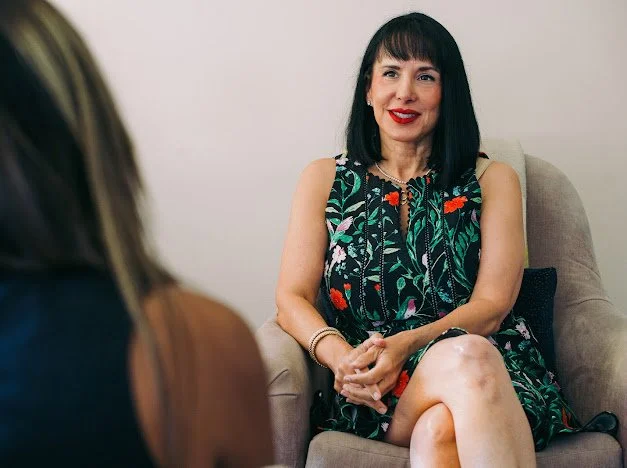Trauma Therapy
Is Unresolved Trauma Impacting Your Life And Relationships?
Are you having a hard time processing a painful experience?
Has this experience impacted every element of your existence—from your work to your daily routine to your relationships?
Do you struggle to feel worthy of love and healing?
And is faith an important aspect of your life?
If any of this sounds familiar, you may be living with unresolved trauma. Whether you suffered abuse and neglect when you were younger or survived an unexpected, life-altering situation (including a major loss), you may have noticed an inability to relax, feel confident, or trust others. Perhaps you’ve even developed a trauma response when distressed—otherwise known as fight, flight, or freeze—which causes you to be hypervigilant and anxious in otherwise ordinary situations.
Living on such high alert has probably taken a toll on your mental health. Maybe you struggle with depression, dissociation, low self-esteem, perfectionism, or an inability to recognize how you feel on a day-to-day basis. Unable to locate the exact source of your anxiety, you may feel defeated or discouraged that you’ll feel stuck in a cycle of distress forever.
Trauma Has A Significant Impact On The Connections We Form With Others
Unresolved trauma commonly rears its head in relationships, whether those relationships are with friends, coworkers, family members, or an intimate partner. You may have developed unhealthy patterns from your family of origin that built a barrier between you and others. When you can’t trust or feel connected to others, it’s hard to form strong bonds. And if you don’t feel worthy of love and affection, you likely feel the need to please others or struggle to create meaningful boundaries.
Pain from your past is making life difficult and uncomfortable. All you want is to feel more secure in your own skin so that you can enjoy your relationships and experience fewer symptoms. Fortunately, therapy is an effective way to address and overcome your trauma so that you can be more comfortable and self-assured.
Trauma Is A Fact Of Life
Though unresolved trauma has a way of making us feel broken and different from others, the truth is that most of us are trauma survivors. Whether or not we’re aware of which painful, scary, or unexpected situation affected us, trauma can seep into every aspect of our lives. Sometimes, it’s difficult to understand where our symptoms originated or if they’re directly related to a traumatic experience. Not to mention, we all develop different responses to trauma based on a range of factors, including our families and mental health history.
Unfortunately, our culture doesn’t fully recognize the impact of trauma and abuse. And many of us are raised with the misconception that mental health is a myth or that trauma can’t be treated with therapy. As a result, we may avoid confronting our experience or compare ourselves to others who seemingly have it worse than we do.
Yet, these patterns are not healthy; they often lead to emotional dysregulation, tension in our relationships, and self-destructive behaviors like substance abuse. Instead of acknowledging the ways that trauma has impacted our brains—and thus our bodies—we are likely to overlook symptoms and reach for an unrealistic expectation of “having it all together.”
Therapy can be a place where you don’t have to appear a certain way or have all of the answers. As a counselor who specializes in trauma, I will welcome your full range of experience and emotions so that you can heal on a deep level.
Four Seasons Counseling Is A Trauma-Informed Practice Offering Therapy To Individuals Of All Ages And Their Families
Because my therapeutic practice is primarily trauma informed, I have the knowledge and experience to assess your symptoms and help you figure out how they’re related to past trauma. Though you may believe that certain symptoms—including anxious thinking, despair, hypervigilance, and interpersonal issues—appeared on their own, it’s likely that there is some core experience that is causing you distress. Together in the safe space of therapy, we can identify past pains while developing new skills and perspectives to process your trauma.
The Process
Treatment begins with a general intake that will help me understand your history, trauma, and goals for counseling. If you are the parent of a minor (ages 3 – 17), I will ask you to be present for the first portion of the intake to go over confidentiality and expectations. From there, whether you’re in counseling as an individual, couple, or family, I will tailor the therapeutic experience to your needs, offering customized tools to help you better understand and overcome your trauma.
My counseling approach blends trauma-informed methods with behavioral techniques, addressing your trauma on a deep body level as well as on the surface, where disruptive symptoms bubble up and make life uncomfortable. My combination of Eye Movement Desensitization and Reprocessing (EMDR) and Cognitive Behavioral Therapy (CBT) is a safe and evidence-based model that can heal everything from acute trauma to chronic PTSD. And for children and teens in particular, I will incorporate Play Therapy, Art Therapy, and other expressive forms of counseling to help my younger clients explore and express their emotions.
In addition, I am happy to incorporate faith-based perspectives into trauma treatment for clients who identify as Christian or Catholic. Even if elements of your upbringing or religion feel incompatible with going to a therapist, I can help you heal from trauma in a way that honors your faith and values.
With the insights you gain in therapy, you’ll learn more about the psychological impact of trauma and early experiences, healthy attachments, and effective coping strategies. These skills can help you become more present and aware in your relationships as you develop a deeper awareness of your emotional needs.
It is possible to live a more grounded and fulfilling life, free from the pain of past trauma. In understanding the physical, mental, and emotional effects that trauma has had on your life, you can learn to cope and reduce disruptive symptoms. And once you’re able to accept the resilience and awareness you’ve accomplished in therapy, you can observe trauma having less and less control over your life.
Perhaps You’re Considering Trauma Treatment, But Not Sure If Therapy Is Right For You…
-
When seeking out trauma therapy, it’s important to work with a counselor who is specifically trauma informed. These clinicians are specially trained in trauma, and they know how to help clients gently process painful experiences without re-traumatizing them.
I find that the more traumatic events are discussed and processed in the safe space of counseling, the less control trauma has over the lives of my clients. I am here to walk this journey with you so that it feels less intimidating and lonely.
-
This is a common misconception, and in fact, symptoms often get worse—not better—if the subject of trauma is continually avoided. Instead of being properly processed, unresolved trauma usually shows up in other ways, including anxiety, depression, substance abuse, and other unhealthy patterns.
Your trauma won’t go away if you ignore it. Because I am a trauma-informed therapist, I can help you identify the source of your symptoms and process your trauma on a deep level so that true healing can take place.
-
We all encounter trauma in our lives, and there is not some hierarchy of trauma that makes some peoples’ experiences more valid than others. What happened to you is personal and meaningful, and I will handle your experience with care—not judgment.
You Don’t Have To Simply Survive, You Can Thrive
Trauma has made life uncomfortable for you mentally, emotionally, and physically, but you don’t have to live with these symptoms forever. In therapy at Four Seasons Counseling, you can experience healing on a deep level as you overcome the lasting effects that trauma has had on your life.
For a free, 20-minute consultation to find out more about my trauma-informed approach to treatment, please call (916) 425 – 2692 or contact me.






